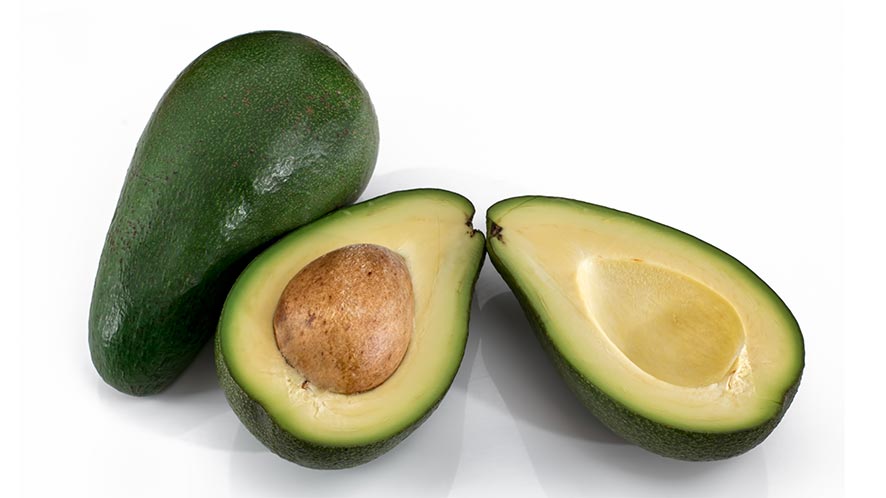Avocado Nutritional Value and 12 Health Benefits
Avocado Nutritional Value
Avocado, colloquially known as alligator pear, is a fruit native to Central Mexico and belongs to the plant family Lauraceae along with cinnamon, camphor, and bay laurel. There are dozens of varieties of avocados that are available, with the most common being, Hass.
Although generally served raw, in some countries like the Philippines, Brazil, Indonesia, Vietnam, and Southern India, avocados are frequently used in milkshakes and are sometimes added to ice creams. The fruit is loved for its subtly flavored smooth and creamy texture. Because of its high monounsaturated fat content; it is often used as a substitute for meat in sandwiches and salads.
But high monounsaturated fat content is not all, for avocados are also rich in potassium (higher potassium than a medium banana) and all other essential nutrients including vitamin C, vitamin K, folate, copper, and phytonutrients. Keep reading to learn more about the nutritional value of avocados.
Avocado Nutritional Value and Facts
Amount of Avocados: 1 cup
Total Weight of Avocados: 150 g
| Nutrients | Amount |
| Basic Components | |
| Proteins | 3.0 g |
| Water | 110 g |
| Ash | 2.4 g |
| Calories | |
| Total Calories | 240 |
| Calories from Carbohydrates | 45.9 |
| Calories from Fats | 184 |
| Calories from Proteins | 10.1 |
| Carbohydrates | |
| Total Carbohydrates | 12.8 g |
| Dietary Fiber | 10.1 g |
| Starch | 0.2 g |
| Sugar | 1 g |
| Fats & Fatty Acids | |
| Total Fat | 22 g |
| Saturated Fat | 3.2 g |
| Monosaturated Fat | 14.7 g |
| Polyunsaturated Fat | 2.7 g |
| Total Omega-3 Fatty Acids | 165 mg |
| Total Omega-6 Fatty Acids | 2534 mg |
| Vitamins | |
| Vitamin A | 219 IU |
| Vitamin C | 15 mg |
| Vitamin E | 3.1 mg |
| Vitamin K | 31.5 mcg |
| Vitamin B6 | 0.4 mg |
| Thiamine | 0.1 mg |
| Riboflavin | 0.2 mg |
| Niacin | 2.6 mg |
| Folate | 122 mg |
| Pantothenic Acid | 2.1 mg |
| Choline | 21.3 mg |
| Betaine | 1.1 mg |
| Minerals | |
| Calcium | 18 mg |
| Iron | 0.8 mg |
| Magnesium | 43.5 mg |
| Phosphorus | 78 mg |
| Potassium | 727 mg |
| Sodium | 10.5 mg |
| Zinc | 1 mg |
| Copper | 0.3 mg |
| Manganese | 0.2 mg |
| Selenium | 0.6 mcg |
| Fluoride | 10.5 mcg |

Health Benefits of Avocado
- According to a recent study, beta-sitosterol, a compound that is found abundantly in avocados has been proven to be effective in bringing down the blood cholesterol levels and increasing good cholesterol levels.
- Phytonutrient compounds such as polyphenols and flavonoids are known to possess anti-inflammatory properties that reduce the risk of inflammatory and degenerative disorders. Both these compounds are present in good proportions in avocados.
- Carotenoid lutein present in avocado is known to protect against age-related macular degeneration and cataracts.
- The monounsaturated fats and soluble fiber present in avocados help regulate steady blood sugar levels. Monounsaturated fats in particular can reverse insulin resistance.
- Avocados are rich in folate content cup of avocado provides about 23% of the daily value for folate. This high amount of folate in avocado is essential in the prevention of birth defects such as neural tube defects and spina bifida.
- According to the studies, the oleic acid present in avocados can reduce the growth of prostate cancer. It is also effective in preventing breast cancer.
- Many powerful antioxidants are found in avocados that help prevent aging symptoms, boost the immune system, and encourage a healthy nervous system.
- Consumption of avocados is one of the best ways to get rid of bad breath. It cleanses the intestine, which is the real cause of the coated tongue and the unpleasant condition.
- According to the studies, eating avocados regularly is linked with increased nutrient absorption: five times the amount of carotenoids (beta carotene and Lycopene) as compared to those who did not have avocados in their diet.
- Avocado oil is added to many cosmetics because of its ability to nourish the skin and make it glow. It also aids in treating psoriasis, a skin disease that causes skin redness and irritation.
- Since avocados have a high amount of calories as compared to other fruits (200 calories per 100 gm as compared to 60-80 per 100 gm in other fruits), it is considered one of the best healthy diets for people who want to gain weight without an excess of saturated fats and sugar.
- Vitamin B6, folic acid, vitamin E, glutathione, and monounsaturated fats present in avocado help maintain a healthy heart. Vitamin B6 and folic acid, in particular, regulate homocysteine levels, a high level of which is associated with heart disease. Moreover, avocados are also a great source of potassium, which helps in controlling blood pressure levels.
Now that you’ve gone through its nutritional facts, make avocados a part of your regular diet to reap the health benefits related to it.
